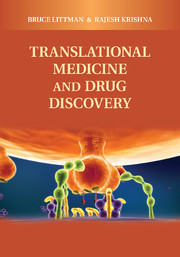Book contents
- Frontmatter
- Contents
- Contributors
- Preface
- Translational Medicine and Drug Discovery
- SECTION I TRANSLATIONAL MEDICINE: HISTORY, PRINCIPLES, AND APPLICATION IN DRUG DEVELOPMENT
- SECTION II BIOMARKERS AND PUBLIC–PRIVATE PARTNERSHIPS
- SECTION III FUTURE DIRECTIONS
- 13 IMPROVING THE QUALITY AND PRODUCTIVITY OF PHARMACOMETRIC MODELING AND SIMULATION ACTIVITIES: THE FOUNDATION FOR MODEL-BASED DRUG DEVELOPMENT
- 14 EMBRACING CHANGE: A PHARMACEUTICAL INDUSTRY GUIDE TO THE 21ST CENTURY
- Index
- References
13 - IMPROVING THE QUALITY AND PRODUCTIVITY OF PHARMACOMETRIC MODELING AND SIMULATION ACTIVITIES: THE FOUNDATION FOR MODEL-BASED DRUG DEVELOPMENT
Published online by Cambridge University Press: 04 April 2011
- Frontmatter
- Contents
- Contributors
- Preface
- Translational Medicine and Drug Discovery
- SECTION I TRANSLATIONAL MEDICINE: HISTORY, PRINCIPLES, AND APPLICATION IN DRUG DEVELOPMENT
- SECTION II BIOMARKERS AND PUBLIC–PRIVATE PARTNERSHIPS
- SECTION III FUTURE DIRECTIONS
- 13 IMPROVING THE QUALITY AND PRODUCTIVITY OF PHARMACOMETRIC MODELING AND SIMULATION ACTIVITIES: THE FOUNDATION FOR MODEL-BASED DRUG DEVELOPMENT
- 14 EMBRACING CHANGE: A PHARMACEUTICAL INDUSTRY GUIDE TO THE 21ST CENTURY
- Index
- References
Summary
Introduction
There is little disagreement among the stakeholders in the pharmaceutical industry and other discovery and development establishments about the existence of a crisis in research and development (R&D) productivity. There are mounting concerns about the difficulty of securing regulatory approval, the recent spates of late-stage failures to lack of efficacy, the withdrawal of drugs after commercialization because of safety concerns, the threat of generic substitution, and complaints over the prices of new medicines. Each of these concerns, and the corresponding societal, political, academic, and industrial responses, will have significant implications for the vitality and sustainability of the pharmaceutical industry and other similar establishments. These implications, in turn, will affect our ability to capitalize on new advances in biomedical knowledge and to develop innovations in diagnostic tools, therapeutic interventions, and preventive treatment.
Although there is agreement on the challenges, reaching consensus on the solution is much more difficult. Each functional area in the drug development enterprise has engaged in a variety of initiatives to increase productivity and reduce costs, ranging from deploying new technology and enhancing the information technology (IT) infrastructure to outsourcing and relocating overseas. Although many of these initiatives have merit, it is becoming clearer that more radical changes are necessary. In particular, the central process of knowledge generation has come under scrutiny along with the strategic and governance aspects of the decision-making process.
Information
- Type
- Chapter
- Information
- Translational Medicine and Drug Discovery , pp. 303 - 327Publisher: Cambridge University PressPrint publication year: 2011
